
February 1
1862 USA: "The Battle Hymn of the Republic," a poem by Julia Ward Howe, is published in the Atlantic Monthly. (AP)
1905 Morocco: Germany contests French rule:
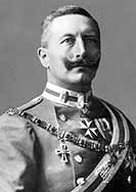
The Morocco crisis of 1905 helps illustrate a couple of points regarding German diplomatic policy of the time. The first of these is the threat or implication of war to achieve political ends. The Germans were big fans of von Clausewitz, one of Napoleon's Prussian officers who literally wrote the book on modern warfare. The second is an attempt to break up the entente of the nations Germany saw as attempting to encircle her.

1916 World War I: Western Front:: As the rain finally declines in intensity, the troops on both sides of the Western Front begin to repair and restore collapsed trenches. So busy are both sides in tidying up for the Spring that they barely even shoot at each other anymore. Casualties for Gefreiter Adolf Hitler's 16th RIR [List Regiment] in January-February are a mere 16 dead and 70 wounded; the coming April will yield only 6 dead and 40 wounded. [For further details, Click here.]
1917 World War I: Germany resumes unrestricted submarine warfare: On this day in 1917, the lethal threat of the German U-boat submarine raises its head again, as Germany returns to the policy of unrestricted submarine warfare it had previously suspended in response to pressure from the United States and other neutral countries. [For further information, click here]
1923 Italy: The Fascists Voluntary Militia is formed under Mussolini:
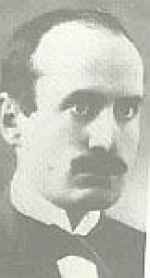
Inspired by Giuseppe Garibaldi's Redshirts, the Blackshirts were organized by Benito Mussolini as a military tool of his Fascist movement. The founders of the paramilitary groups were nationalist intellectuals, former army officers or members of the special corp Arditi, young landowners opposing peasants' and country labourers' unions. Their methods became harsher as Mussolini's power grew, and they used violence, intimidation, and murder against Mussolini's opponents. One of their distinctive techniques was force-feeding castor oil.
1924 The new MacDonald government in Britain recognizes the USSR.
1925 Weimar: KPD: The first national conference of KPD's Rotfrontkaempferbund takes place in Berlin.
The KPD's first congress was addressed by Gregory Zinoviev, the Russian Bolshevik and head of the Comintern. Throughout the 1920's the KPD was very much under the influence of Communist Party of the Soviet Union. Germany's KPD became the largest Communist Party outside the Soviet Union and was fairly successful.
1927 Various:
Volkishness: Count Franz Friedrich von Hochberg writes a letter to Johann Walthari Woelfl which he publishes in the first issue of the new Ostara series. (THP)
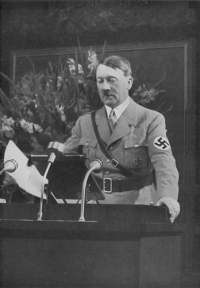
Weimar: The ban on Hitler speaking in public in Saxony is lifted. (Maser)
1933 Various:
Nazi Germany: Hitler makes his first radio address to the German people since becoming Chancellor.
As regards its foreign policy the National Government considers its highest mission to be the securing of the right to live and the restoration of freedom to our nation. Its determination to bring to an end the chaotic state of affairs in Germany will assist in restoring to the community of nations a State of equal value and, above all, a State which must have equal rights. It is impressed with the importance of its duty to use this nation of equal rights as an instrument for the securing and maintenance of that peace which the world requires today more than ever before. [For the full text, Click here.]
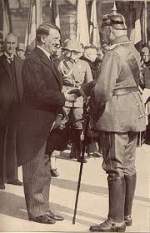
Nazi Germany: Hitler obtains a decree from Hindenburg ordering dissolution of the Reichstag. New elections are called for March 5, 1933. Hitler has promised that this will be 'the last election.' It is a promise he will keep. [See: How Did Adolf Hitler Consolidate his Power?]
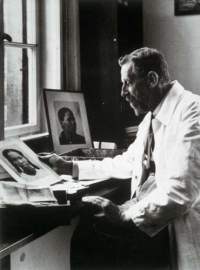
Race: Professor Fischer gives a lecture, entitled: "Racial crosses and intellectual achievement" in the Harnack House of the Kaiser Wilhelm Institute in Berlin. (THP)
Italy publishes the Fascist Ten Commandments. (THP)
1934 Austria: Various:

All rival political parties are dissolved as Chancellor Engelbert Dollfuss establishes one-party rule in Austria. Often described as a proto-Fascist, he is determined to keep Austria independent of both Germany and the Communists. Note: A brief but bloody civil war soon breaks out. Socialist resistance to Dollfuss' measures leads to the government's bombardment of Vienna's large Socialist quarter. [See: Austria: The Other Germany.]
Vienna: Police outlaw the sale of anti-Jewish or pro-Nazi publications on the streets.
1935 Various:
Anglo-German Conference: The main topic is German rearmament
Part V of the 1919 Treaty of Versailles had imposed severe restrictions on the size and capacities on the armed forces of the Reich. In regards to the Navy, Germany was allowed no submarines, no naval aviation, and no battleships; the total naval forces allowed to the Germans were six heavy cruisers of no more than 10,000 tons displacement, six light cruisers of no more than 6,000 tons displacement, 12 destroyers of no more than 800 tons displacement and 12 torpedo boats. Through the interwar years, German opinion had protested these restrictions as harsh and unjust, and demanded that either all of the other states of Europe disarm down to German levels, or alternatively, Germany be allowed to rearm to the level of all the other European states.
Italy sends troops to East Africa.
1937 Nazi Germany: Various:
Nobel Prize: German citizens are prohibited from accepting any form of Nobel Prize. "To the person who shall have done the most or the best work for fraternity between the nations, for the abolition or reduction of standing armies."
Nazi Party: In Hitler's original Cabinet of 30 January 1933, there were only three Cabinet members who were members of the Party: Hermann Goering, Wilhelm Frick, and Hitler. On 30 January 1937 Hitler executed acceptance into the Party of those Cabinet members who were not already members of the Nazi Party.
From this day'sVoelkischer Beobachter, South German edition:In view of the anticipated reopening of the rolls for Party membership, the Fuehrer, as the first step in this regard, personally carried out the enlistment into the Party of the members of the Cabinet who so far had not belonged to it; and he handed them simultaneously the Gold Party Badge, the supreme badge of honor of the Party. In addition, the Fuehrer awarded the Gold Party Badge to Colonel General Baron von Fritsch; Generaladmiral, Dr. Raeder; the Prussian Minister of Finance, Professor Popitz; and the Secretary of State and Chief of the Presidential Chancellery, Dr. Meissner. The Fuehrer also honored with the Gold Party Badge the Party members State Secretary Dr. Lammers, State Secretary Funk, State Secretary Korner, and State Secretary General of the Air Force Milch.
Press Reaction to Hitler's January 30 Speech:
A certain amount of reflection is required to classify, appraise, and digest all the varied implications left by such a speech as that made by Chancellor Adolf Hitler before the Reichstag yesterday Germany must choose between co-operation and isolation. But Hitler has not chosen, or if he has, he did not make known his choice yesterday. He merely indicated he was willing to discuss matters before announcing it. "The era of German surprises has ended," Hitler said. That is so much gain and should help soothe European nerves. But he has not surrendered or even modified a single point in his program, although expressing his willingness to talk about all points. This is no surprise. Anyone who has devoted more than casual study to Nazism and its mentality long ago accepted it as an axiom that its program would never voluntarily be modified. As to arms limitation, Hitler definitely refuses to trade German armaments for economic concessions, as it was expected he would. However, if the speech is read correctly, he does leave the door open for an armament agreement without economic ties on the basis of "security." That means security according to the German idea and not the French idea. (New York Times)
Press Reaction to Hitler's January 30 Speech:
The part concerned with international affairs was a blend of defense and defiance. The Fuehrer's pronouncements have a way of proving later to have had more significance in unexpected places than they seemed to have . . . . He withdrew‑‑symbolically, of course‑‑Germany's signature from the so-called "War-guilt" paragraph of the treaty. The Times (London)
Press Reaction to Hitler's January 30 Speech: "The character of the Chancellor's renewed demand for equal rights is obvious. (Le Temps)
1940 World War II: Finland: Soviets begin a new offensive.
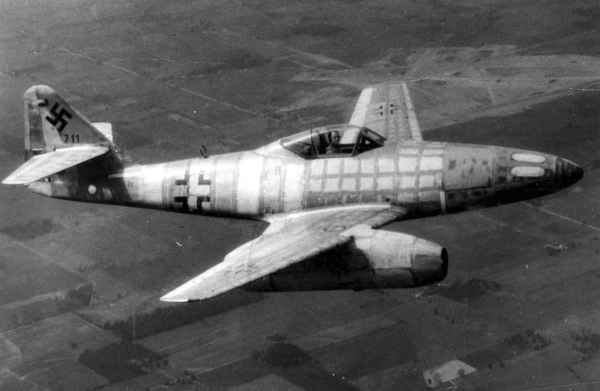
1942 World War II: Various:
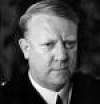
Norway: Vidkun Quisling becomes prime minister:
Quisling had little popular support, and the Quisling government lasted only five days, after which Josef Terboven was installed as Reichskommissar (Commissioner), the highest authority in Norway, reporting directly to Hitler. The relationship between Quisling and Terboven was tense, although Terboven, presumably seeing an advantage in having a Norwegian in a position of power to reduce resentment in the population.
Pacific: Planes of the US Pacific fleet attack Japanese bases in the Marshall and Gilbert Islands.
1943 World War II: Various:
North Africa: American tanks and infantry are battered by German positions at Fais pass. [See: The Mediterranean Strategy.]
Netherlands: Mussert forms a pro-Nazi shadow cabinet.
Japanese begin evacuation of Guadalcanal:
On this day, Japanese forces on Guadalcanal Island, defeated by [US] Marines, start to withdraw after the Japanese emperor finally gives them permission.
On July 6, 1942, the Japanese landed on Guadalcanal Island, part of the Solomon Islands chain, and began constructing an airfield. In response, the U.S. launched Operation Watchtower, in which American troops landed on five islands within the Solomon chain, including Guadalcanal. The landings . . . met with much initial opposition from the Japanese defenders, despite the fact that the landings took the Japanese by surprise because bad weather had grounded their scouting aircraft. "I have never heard or read of this kind of fighting," wrote one American major general on the scene. "These people refuse to surrender."
The Americans who landed on Guadalcanal had an easier time of it, at least initially. More than 11,000 Marines landed, but 24 hours passed before the Japanese manning the garrison knew what had happened. The U.S. forces quickly met their main objective of taking the airfield, and the outnumbered Japanese troops temporarily retreated. Japanese reinforcements were landed, though, and fierce hand-to-hand jungle fighting ensued . . . . but when the U.S. Navy supplied reinforcement troops, the Americans gained the advantage. By February 1943, the Japanese retreated on secret orders of their emperor. In fact, the Japanese retreat was so stealthy that the Americans did not even know it had taken place until they stumbled upon abandoned positions, empty boats, and discarded supplies. [See: Guadlcanal Diary.]
Romania: Feb 1-15: Emissaries of Mihai Antonescu in Bern, Switzerland, make contact with the West through Papal Nuncio Bernardini and in Bucharest through the Turkish Ambassador.
1944 The Times of London discloses that the last will and testament of Austrian-born Sir Henry Strakosch had converted 'interest free' loans to Winston Churchill and Lord Simon into gifts. Simon had received 10,000 pounds, and Churchill twice as much. Strakosch was a multimillionaire who made his fortune in gold mining in South Africa. (THP)
1945 World War II: Various:

The original Siegfried line (Siegfriedstellung) was a line of defensive forts and tank defenses built by Germany as a section of the Hindenburg Line 1916-1917 in northern France during World War I. However, in English, Siegfried line more commonly refers to the similar World War II defensive line, built during the 1930s, opposite the French Maginot Line, which served a corresponding purpose. The Germans themselves called this the Westwall, but the Allies renamed it.
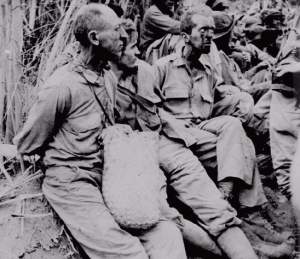
Bataan Death March: US Rangers and Filipino guerrillas rescue 513 American survivors of the Bataan Death March.
1946 Various:
Nuremberg Tribunal: Day 48. M. Edgar Faure's Presentation of the case regarding Germanization and persecution. Testimony of Emil Reuter. Continuation of M. Charles Dubost's Presentation of the case regarding atrocities committed in the occupied countries of the West.
M. Charles Dubost:The German people whose military virtue we recognize, whose poets and musicians we love, whose application to work we admire, and who did not fail to give examples of probity in the most noble works of the spirit; this German people, which came rather late to civilization, beginning only with the eighth century, had slowly raised itself to the ranks of nations possessing the oldest culture. The contribution to modern or contemporary thought seemed to prove that this conquest of the spirit was final; Kant, Goethe, Johann Sebastian Bach belong to humanity just as much as Calvin, Dante, or Shakespeare; nevertheless, we behold the fact that millions of innocent men have been exterminated on the very soil of this people, by men of this people, in execution of a common plan conceived by their leaders, and this people made not a single effort to revolt.
This is what has become of it because it has scorned the virtues of political freedom, of civic equality, of human fraternity. This is what has become of it, because it forgot that all men are born free and equal before the law, that the essential action of a state has for its purpose the deeper and deeper penetration of a respect for spiritual liberty and fraternal solidarity in social relations and in international institutions.
It allowed itself to be robbed of its conscience and its very soul. Evil masters came who awakened its primitive passions and made possible the atrocities which I have described to you. In truth, the crime of these men is that they caused the German people to retrogress more than 12 centuries.
Their crime is that they conceived and achieved, as an instrument of government, a policy of terrorism toward the whole of the subjugated nations and toward their own people; their crime is that they pursued, as an end in itself, a policy of extermination of entire categories of innocent citizens. That alone would suffice to determine capital punishment. [For the full text of today's proceedings, Click here.]
United Nations: Norwegian statesman Trygve Lie is chosen to be the first secretary-general. (AP)
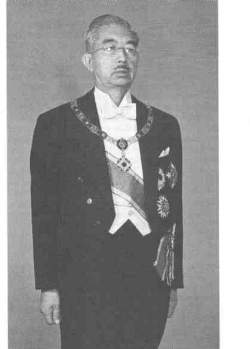
1950 Japan: The USSR demands condemnation of Emperor Hirohito for war crimes.
1951 Cold War: U.N. condemns PRC for aggression:
By a vote of 44 to 7, the United Nations General Assembly passes a resolution condemning the communist government of the People's Republic of China for acts of aggression in Korea. It was the first time since the United Nations formed in 1945 that it had condemned a nation as an aggressor.
In June 1950, communist forces from North Korea invaded South Korea in an attempt to unify the nation, which had been divided in 1945 when Soviet troops occupied the northern portion of the country and U.S. troops the southern in order to accept the surrender of Japanese forces in Korea. In late 1950, hundreds of thousands of Chinese troops crossed into North Korea to do battle with U.S. forces, which had earlier driven the invading North Korean forces out of South Korea. By 1951, the United States was deeply involved in Korea, having committed thousands of troops and millions of dollars in aid to South Korea.
The General Assembly vote followed unsuccessful attempts by the U.S. delegation to the United Nations to have the Security Council take action against the Chinese. Exercising his nation's veto power, the Soviet representative on the Security Council consistently blocked the U.S. effort. (The United States, France, Great Britain, the Soviet Union, and Nationalist China had absolute veto power of any Security Council proposal.) Turning to the General Assembly, the U.S. delegation called for the United Nations to condemn communist China as an aggressor in Korea. The final vote fell largely along ideological lines, with the communist bloc nations of the Soviet Union, Byelorussia, Ukraine, Poland, and Czechoslovakia, joined by neutralists Burma and India, voting against the resolution. Despite the votes against it, the resolution passed, declaring that China was "engaged in aggression in Korea," and asked that it "cause its forces and nationals in Korea to cease hostilities against the United Nations forces and to withdraw from Korea."
The action was largely symbolic, because many nations-including some that voted for the resolution-were reluctant to take more forceful action against the People's Republic of China for fear that the conflict in Korea would escalate. While economic and political sanctions could have been brought against China, the United Nations decided to take no further action. The Korean War dragged on for two more bloody years, finally ending in a stalemate and cease-fire in 1953. By that time, over 50,000 U.S. troops had died in the conflict. (History.com)
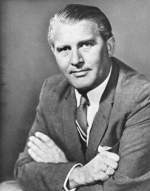
1956 Wunderwaffen: As a sort of consolation prize for losing the Project Orbiter contract to the Air Force, Werner von Braun's group [Note: Werner von Braun, Hitler's former chief rocket scientist, is now working for the US.] at Redstone receives approval to develop an intermediate range (1,500 miles) ICBM, with a 2,500 pound payload dubbed Jupiter. The Redstone Arsenal is renamed the US Army Ballistic Missile Agency (ABMA). Brig. General John B. Medaris becomes commander, with von Braun as director of the Development Operations Division, under Brig. General Holger Toftoy.
1957 Death: Friedrich von Paulus, former German field marshal:

German general, later promoted to field marshal, during World War II . . . . Against his better judgment, he followed Adolf Hitler's orders to hold the Army's position in Stalingrad under all circumstances, even after his forces were completely encircled by the enemy . . . . Despite this, he made a surrender, hours after he was raised to the marshal's rank, in February 1943. He became a vocal critic of the Nazi regime while in Soviet captivity, joining the Russian-sponsored National Committee for a Free Germany and appealing to Germans to surrender. He later acted as a witness for the prosecution at the Nuremberg trials. He was released in 1953, two years before the repatriation of the remaining German POWs (mostly other Stalingrad veterans) who had been designated war criminals by the Soviets. Paulus remains a controversial historic figure, due to his late conversion to the anti-Nazi cause and behavior towards Hitler. He is frequently unfavorably compared with Erwin Rommel . . . . Friedrich Paulus died in East Germany, as an inspector of police.
Educated at Munich and Goettingen, he taught at the University of Leipzig (1927-41) and directed the Max Planck Institute for Physics (1942 -76). In 1925 he solved the problem of how to account for the stationary discrete energy states of an anharmonic oscillator, a solution that launched the development of quantum mechanics. In 1927 he published his famous uncertainty principle. He also made important contributions to the theories of the hydrodynamics of turbulence, the atomic nucleus, ferromagnetism, cosmic rays, and subatomic particles. He was awarded the Nobel Prize for Physics in 1932 for his work on quantum mechanics. He led Germany's efforts in World War II (1939 -45) to develop an atomic bomb. [See: Where Would We Be Without Hitler's Scientists?]
1960 USA: Four black college students begin a sit-in protest at a lunch counter in Greensboro, N.C., where they were refused service. (AP)
1976 Death: Werner K. Heisenberg:
Educated at Munich and Goettingen, he taught at the University of Leipzig (1927-41) and directed the Max Planck Institute for Physics (1942 -76). In 1925 he solved the problem of how to account for the stationary discrete energy states of an anharmonic oscillator, a solution that launched the development of quantum mechanics. In 1927 he published his famous uncertainty principle. He also made important contributions to the theories of the hydrodynamics of turbulence, the atomic nucleus, ferromagnetism, cosmic rays, and subatomic particles. He was awarded the Nobel Prize for Physics in 1932 for his work on quantum mechanics. He led Germany's efforts in World War II (1939 -45) to develop an atomic bomb. [See: Where Would We Be Without Hitler's Scientists?]
1979 Iran: Ayatollah Ruhollah Khomeini returns from exile and soon leads the Iranian Revolution to overthrow the US-backed Pahlavi dynasty. [For further information, click here.]
Edited by Levi Bookin (Copy editor)
levi.bookin@gmail.com



Click to join 3rdReichStudies

FAIR USE NOTICE: This site may contain copyrighted material the use of which has not always been specifically authorized by the copyright owner. We are making such material available in our efforts to advance understanding of historical, political, human rights, economic, democracy, scientific, environmental, and social justice issues, etc. We believe this constitutes a 'fair use' of any such copyrighted material as provided for in section 107 of the US Copyright Law. In accordance with Title 17 U.S.C. Section 107, the material on this site is distributed without profit to those who have expressed a prior interest in receiving the included information for research and educational purposes. If you wish to use copyrighted material from this site for purposes of your own that go beyond 'fair use', you must obtain permission from the copyright owner.
Please note that the list-owner and the moderators are not responsible for, and do not necessarily approve of, the random ads placed on our pages by our web server. Unfortunately, they are the price one pays for a 'free' website.